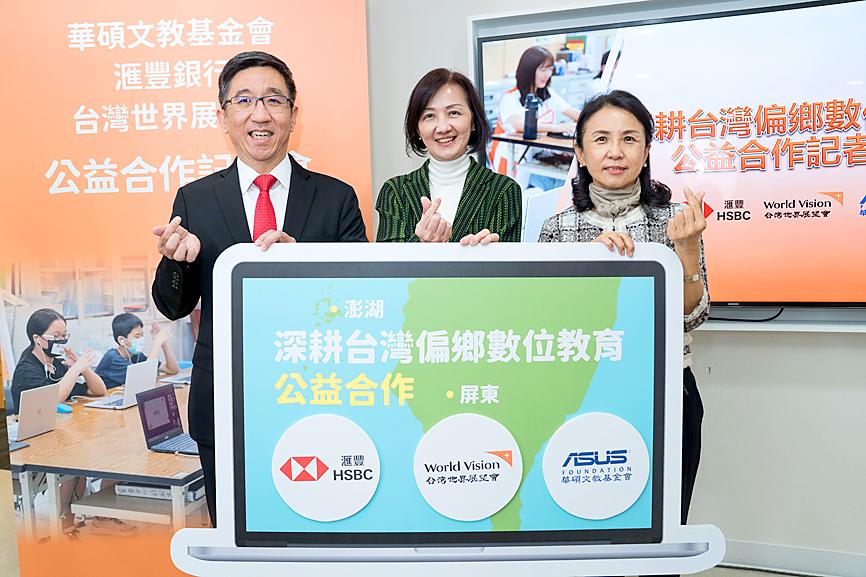HSBC Bank Taiwan Ltd (匯豐台灣商銀) has partnered with Asustek Computer Inc (華碩) and World Vision Taiwan to launch a program that provides computers and financial education to children in remote areas.
Local schools shifted to online classes in May when the government imposed a nationwide level 3 COVID-19 alert, but many children in remote areas could not take the classes as they lacked computers or digital devices due to their economic situation, World Vision Taiwan acting director Yvonne Nieh (聶海華) told a news conference in Taipei yesterday.
Up to 83 percent of low-income families in Taiwan did not have Internet access at home, and 43 percent of children in low-income families did not have digital devices, a survey conducted by World Vision Taiwan earlier this year showed.

Photo courtesy of HSBC Bank Taiwan Ltd
“In some cases, there was only one computer in a family, which was not enough as the children have to take classes at the same time,” Nieh said.
This limited the children’s access to online learning resources and put them at risk of lagging behind their peers, HSBC Taiwan said.
Children’s right to education should not be impeded by a lack of computers, it added.
As part of the program, the bank would donate 250 notebook computers to children in remote areas, such as Penghu and Pingtung County, while Asustek, one of the bank’s corporate clients, would donate 128 computers for distribution through World Vision Taiwan, the companies said.
Nieh said that World Vision Taiwan sends iPads to elementary-school students, and computers or notebooks for those who attend high school or college.
Besides donating computers, HSBC Taiwan offers financial education to children in remote areas, as solid financial knowledge would help them become independent, HSBC Bank Taiwan chief executive officer Adam Chen (陳志堅) said.
“In our education program, we teach basic financial knowledge, such as foreign exchange or banks’ everyday operations, to the children as it is useful. Some children have never used automatic-teller machines,” Chen said.
Sixty children had attended the education program this year, the bank said.
Before the COVID-19 pandemic, HSBC had invited children to its physical branches and gave them guided tours so that they could see how a bank operates, Chen said.
A total of 900 children had attended the tours, the bank said.

CHIP RACE: Three years of overbroad export controls drove foreign competitors to pursue their own AI chips, and ‘cost US taxpayers billions of dollars,’ Nvidia said China has figured out the US strategy for allowing it to buy Nvidia Corp’s H200s and is rejecting the artificial intelligence (AI) chip in favor of domestically developed semiconductors, White House AI adviser David Sacks said, citing news reports. US President Donald Trump on Monday said that he would allow shipments of Nvidia’s H200 chips to China, part of an administration effort backed by Sacks to challenge Chinese tech champions such as Huawei Technologies Co (華為) by bringing US competition to their home market. On Friday, Sacks signaled that he was uncertain about whether that approach would work. “They’re rejecting our chips,” Sacks

It is challenging to build infrastructure in much of Europe. Constrained budgets and polarized politics tend to undermine long-term projects, forcing officials to react to emergencies rather than plan for the future. Not in Austria. Today, the country is to officially open its Koralmbahn tunnel, the 5.9 billion euro (US$6.9 billion) centerpiece of a groundbreaking new railway that will eventually run from Poland’s Baltic coast to the Adriatic Sea, transforming travel within Austria and positioning the Alpine nation at the forefront of logistics in Europe. “It is Austria’s biggest socio-economic experiment in over a century,” said Eric Kirschner, an economist at Graz-based Joanneum

BUBBLE? Only a handful of companies are seeing rapid revenue growth and higher valuations, and it is not enough to call the AI trend a transformation, an analyst said Artificial intelligence (AI) is entering a more challenging phase next year as companies move beyond experimentation and begin demanding clear financial returns from a technology that has delivered big gains to only a small group of early adopters, PricewaterhouseCoopers (PwC) Taiwan said yesterday. Most organizations have been able to justify AI investments through cost recovery or modest efficiency gains, but few have achieved meaningful revenue growth or long-term competitive advantage, the consultancy said in its 2026 AI Business Predictions report. This growing performance gap is forcing executives to reconsider how AI is deployed across their organizations, it said. “Many companies

Taiwan’s long-term economic competitiveness will hinge not only on national champions like Taiwan Semiconductor Manufacturing Co. (TSMC, 台積電) but also on the widespread adoption of artificial intelligence (AI) and other emerging technologies, a US-based scholar has said. At a lecture in Taipei on Tuesday, Jeffrey Ding, assistant professor of political science at the George Washington University and author of "Technology and the Rise of Great Powers," argued that historical experience shows that general-purpose technologies (GPTs) — such as electricity, computers and now AI — shape long-term economic advantages through their diffusion across the broader economy. "What really matters is not who pioneers